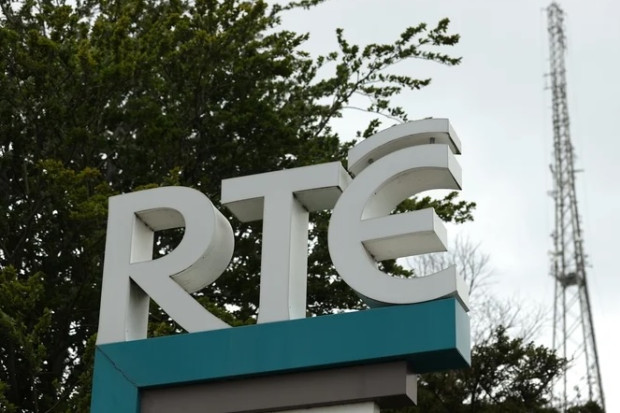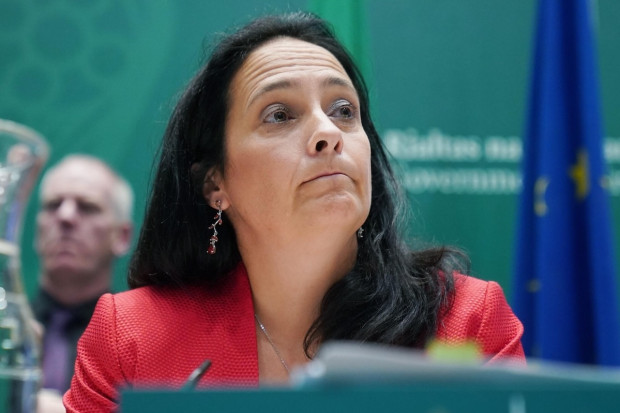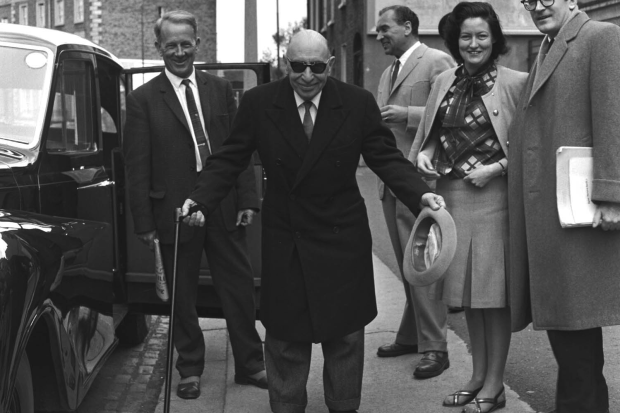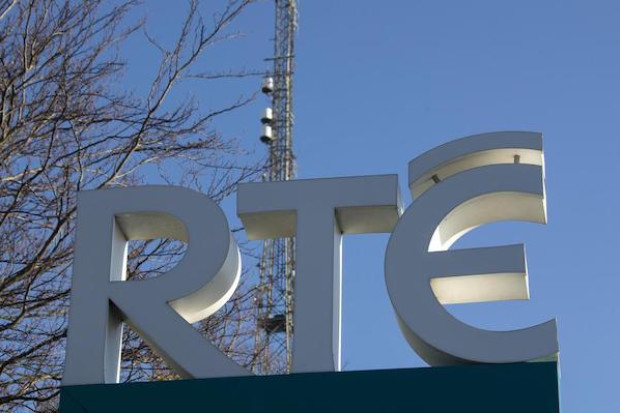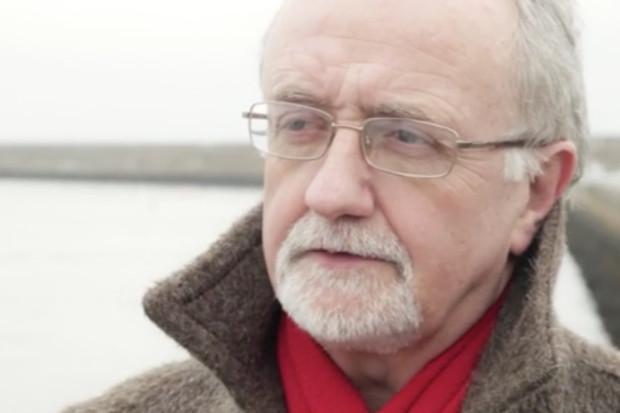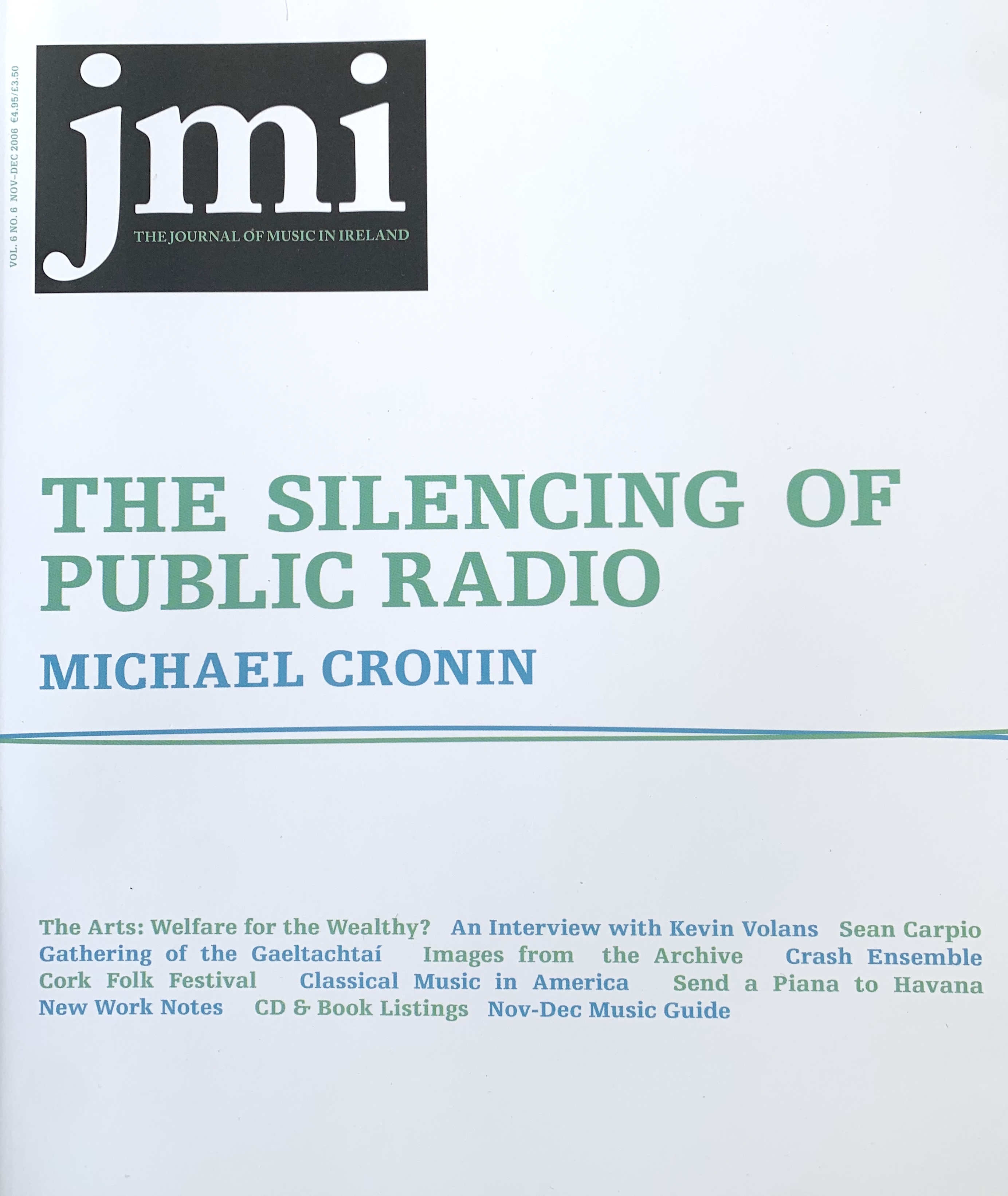
The Silencing of Public Radio
What is happening to the arts, music and culture on RTÉ, the national broadcaster? Is ‘drive-time’ now all the time when it comes to radio? And what does this mean for Irish society?
‘The first language of this country is supposed to be Irish,
but it’s not. It’s silence.’
Neil Belton, A Game with Sharpened Knives
In Neil Belton’s recent novel, the Austrian physicist Edwin Schrödinger, wintering out in wartime Ireland, finds that his Irish friend Sinéad is exercised not so much by the Irish ability to remember as to forget. If Sinéad were to find herself in contemporary Ireland she might find herself living through an Emergency of a different kind, literally driven to distraction by the cost of careless talk. The changes to the schedule of RTÉ Radio 1 with the expressed desire to expand ‘speech radio’ is in a sense the continued pursuit of silence by other means. The significance of these changes lies less in the loss of particular programmes (however regrettable) as in what it is telling us about the broadcasting culture of present-day Ireland.
In the mid-1960s less than a third of the 22 per cent of children who did the Leaving Certificate examination went on to university. By the beginning of the new century almost 60 per cent of Irish school-leavers went on to enter third-level education. For four decades there has been a continued and welcome rise in the educational attainments of the population. The country has never had such a large number of educated people and the figures continue to rise. Despite continued concerns over access, the government has welcomed this development as part of a larger commitment to transform Ireland into a ‘Knowledge Society’. Hundreds of millions of euro are to be spent on investment in research at third level in Ireland. So as the educational levels of the country are rising and we are being asked to become an active and integral part of an increasingly complex knowledge environment, what has been the response of the broadcaster funded by a population and governments that have placed such a premium on education and knowledge?
The most recent answer has been to make sure that programmes such Rattlebag and The Mystery Train, which require a sustained and informed attention to whole areas of cultural, aesthetic and intellectual practice, are removed from the airwaves. So in one of the many paradoxes of Irish life, as more and more public funds are being invested in formal education to make sure that we know more than our predecessors, other public funds are being directed to make sure that we have nothing like the same access as our forebears to knowledge about art, culture and different areas of human enquiry. As the people become more educated, it becomes less popular to take their education seriously.
For this is one of the core truths of the managerial elitism that masquerades as populism in public-service broadcasting in Ireland: the more you talk about the people, the less you want to know about what they might want to know. When Ana Leddy, the new Head of RTÉ Radio 1, says that ‘what I do is try to create public-service broadcasting with a populist edge’ and goes on to say that, ‘We’re really privileged here that RTÉ Radio 1 is so central in people’s lives’ (Irish Times magazine, 23 September 2006), one wonders what kinds of lives are being imagined here. Looking at the new schedule, the imaginary lives would seem to be incapable of any form of concentrated attention on a subject area, as the listener is whisked from Morning Ireland to The Tubridy Show to Today with Pat Kenny to News at One to Liveline, Mooney, Drivetime, Drivetime Sport and Drivetime with Dave Fanning. If critics of the removal of Rattlebag were dismissed as the idle offspring of the chattering classes, in one of the singular ironies of broadcasting history, it looks like the chattering classes have won. For what is proposed for a greater part of the day is the ‘music and magazine mix’, chatter punctuated by classic hits. The central figure here is not the citizen or even the consumer but the commuter. Drivetime is all the time. It is traffic in the mindset of corporate populism, not intelligence or interest, that dictates the attention span of the listener, as the lights change and gears shift and the cars stutter towards home from edge city. The flow of one hour of talk radio into the next, uninterrupted by difference or novelty or complexity and with the endless rehearsal of the news and feature stories already widely available in the print media, becomes in itself a kind of passing traffic in its mindless and predictable regularity.
Ana Leddy claims that ‘making good popular radio is a very, very serious task’. Unfortunately, for John Kelly, this is what he believed. He took music and radio very seriously. In a profile article on Kelly, Shane Hegarty noted that, ‘He has occasionally been caricatured as a guy who gets paid for playing Tuvan throat music on the radio, and who, through TV programme The View, prattles pretentiously about the arts’ (The Irish Times Weekend Review, 23 September 2006). Kelly offered a robust defence against these charges, but what is interesting here is the intolerant cut to the ‘populist edge’. Ninety years after independence, there is still something intolerable about independent taste (‘Tuvan throat music’), independent judgement (‘prattles’) and independent thought (‘pretentiously’) in Ireland. In a country which puts Beckett on billboards and Joyce on jumpers and sends in the Chieftains before the chartered accountants, culture is tolerated as a calling card for tourism outreach, but any attempt to make it ‘central in people’s lives’ is stoutly resisted as the elitist ruse of pretentious prattlers.
An elite decide what is elitist and what the elite has decided is that the vast majority of listeners should not be allowed comprehensive arts programming during waking hours. The publicly-funded broadcaster offers a programme called, not without irony, The Eleventh Hour. The programme goes out at that time when a workforce with one of the longest working days in Europe is preparing for a brief respite before facing into another day’s commute. It goes out at a time when a whole section of the population in formal education will be bedding down before the next school day. It goes out at a time which assumes that only those already interested will be interested. The level of state funding for the Arts Council has never been higher, but the clear signal from the public broadcaster, from the timetabling of The View to the slot for The Eleventh Hour, is that RTÉ will only ‘Support the Arts’ when at least half the nation is in bed. In a peculiar Gothic twist of public policymaking, it is only after nightfall that the unspeakable are permitted to have their say.
Keep the funny stories coming
The young man lowers himself into a bathtub filled with ice cubes. The expression is one of unrelieved pain. Lest we might wonder at the point or rather pointlessness of the act, we are quickly reassured by the voiceover that the immersion is metaphorical. ‘It’s Extraordinary What They Go Through to Get There.’ The young man is a Gaelic football player who is prepared to subject himself to the most gruelling form of punishment in order to bring his county to the All-Ireland final. Difficulty is the defining quality of his sporting heroism. If he was to announce to the nation that winning the Sam Maguire was effortless, fun, entertaining, a stroll in Croke Park, he would invite incredulity. And yet what is hailed as a virtue on the playing fields is condemned as a vice in the studios.
Tackling aspects of art, music and ideas involves particular kinds of skills, patience and difficulty, and it is questionable whether any kind of insight worth having does not involve a considerable investment of time and effort on the part of the learner. The most persistent and damaging form of condescension practised by corporate managerial elitism is the insistence that entertainment and being entertained are values in and of themselves which must take precedence over everything else when it comes to the arts and ideas. Jim Bennett, the Director of the Museum of the History of Science at the University of Oxford, expresses the problem in a different context. Writing in a recent collection of essays, Science and Irish Culture, he points to the dangers of reducing public understanding of science to the provision of ‘playful exhibits in fun-filled science centres’ and adds:
By offering a science that seems irredeemably juvenile, presented through playful interactives peddling a commensurate clarity and simplicity of vision, it has associated itself with the lost certainties of childhood, and nothing suggests that the public are inclined to relate these experiences to the real, complex, social and ethical problems faced by science as it is encountered in the grown-up world.
When artists are treated simply as entertainers, the consequences are all too obvious. Their role is to appease or decorate or keep the funny stories coming. So the entertainment imperative brings about a strange infantilisation of the speakers and the listenership where the complex and difficult adult lives that people live in late modern Ireland go largely unanalysed and conversation is reduced to the consensual banality of pub patter.
It may be okay for players and athletes to make us publicly aware of how hard it is to do what they do, and commentators will remind us of this constantly, but that artistic and intellectual and scientific expression could be equally difficult is a shameful secret. Anyone who has been an inmate of a secondary school in Ireland can offer eloquent testimony, of course, to forms of difficulty that are the masks of incompetence. Poor explanation can be as readily a cause of incomprehension as innate difficulty. However, no amount of playful exhibitionism can disguise the fact that unconventional art and unconventional thinking – the kinds that drive cultural, societal and economic change – are hard work. What ought to distinguish a public broadcaster from the ad-driven jukeboxes of the private sector is precisely a commitment to working hard at a service that respects rather than anaesthetises the intelligence of its listeners.
Another aspect of the Irish Gothic that informs public media policy in Ireland is that strange form of haunting involving the eternal return of the ‘celebrity’ or the ‘well-known person’. So when Eamon Dunphy is given a new show on a Saturday morning what should it involve but talking yet again to people who are famous for being famous. The celebs that populate the couches of the television studios migrate to the swivel chairs of the radio centre in that endless round of self-regard which is as unenlightening as it is predictable. Every year the largest category by far for entries in the Young Scientists’ Exhibition is the category relating to the Social Sciences. Third-level institutions in Ireland have countless teachers and researchers working in sociology, anthropology, media studies, cultural studies, psychology, languages, philosophy and womens’ studies to name but a handful of disciplines. Each year the Irish Research Council in the Humanities and Social Sciences funds a myriad of projects relating to all aspects of Irish social, political and cultural life. Irish publishers in the humanities and social sciences produce hundreds of titles each year.
But when did you last hear an Irish philosopher on prime-time Irish public radio? When did you last hear an informed discussion on the complex changes in contemporary Irish popular culture from public eating habits to Irish emotional investment in the private car? So rather than providing public access to publicly-funded forms of knowledge that would greatly help in self-understanding in a period of intense change, Irish listeners are condemned either to the self-aggrandising introspection of the great and the good or find themselves on the provincial tail of the Anglo-American publicity beast as it wends its carefully coached way through the chatter boxes of these islands. If we are serious in Ireland about creating a genuine knowledge society, and if we are to develop a notion of active citizenship that goes beyond the well-meaning pieties of good works, it is vital that public broadcasting be restored to its central function of providing an educated citizenry with tools for thought and tools for living. Otherwise, speech radio will leave us permanently and irredeemably speechless.
Published on 1 November 2006
Michael Cronin holds a Personal Chair in the Faculty of Humanities and Social Sciences, Dublin City University. His latest book is Translation goes to the Movies, published by Routledge.










